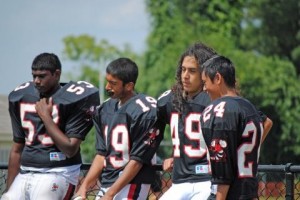Ramadan Tests US Teen Athletes
September 01, 2010
Dora Hasan Mekouar | Washington, DC
When the George C. Marshall High School cross country team assembles each day for practice in Falls Church, Virginia, Maha Hassan is not among the runners.
Instead, the 16-year-old athlete walks around the school track on her own to try to keep her conditioning up.
Hassan is not running this summer because she is observing the Ramadan fast, which means she abstains from all food and drink during the daylight hours.
Added challenge
The timing of the Muslim fast changes each year. It occurs during the ninth lunar month of the year and begins with the sighting of the new moon. This year the holiday began on August 11, during one of the warmest months of the year.
“I would like to run but I have to remember that I am fasting. I have to remember that I would be too tired and wouldn’t be able to try my hardest,” says Hassan. “After Ramadan is over, I can run on my own until winter track in November.”
Hassan has fasted during Ramadan since the age of 13 and decided to observe the holy month this year instead of participating in cross country. Her decision to fast came after spending the summer with her cousins in Sudan.
“When I was talking to my family, I felt like it should be more important to me and that I should be more involved in my religion.”
Hard choices
Young Muslim athletes often try to participate in both fasting and their chosen sport. However, hot summer days have prompted many teen athletes at Marshall High School to reconsider.
Marshall football player Rakin Hamad, 17, is one of them. He fasted last year, enduring grueling practices in the heat without water.
“It was pretty hard. There were some points where it was just too hot. There were times I had to go to the trainer and just lie down.”
After learning that his coach planned to hold two practices a day, Hamad reluctantly decided not to fast this year.
He will start applying to colleges soon, and believes playing on the varsity team could bolster his chances of getting into the university of his choice.
“I just decided I couldn’t fast this year especially since it’s the middle of August when the heat is unbelievable and with two practices, it was just too much.”
Soccer player Carma Khatib has found a middle ground that works for her. She fasted for the first time last year, trying it for one day. Khatib felt the experience helped her empathize with the less fortunate, who often do not have food to eat.
This year, she’s figuring it out as she goes along.
“I’ve fasted a couple of days. During soccer, I either don’t fast or I fast but I drink water so I stay hydrated.”
Personal decisions
These different approaches to observing Ramadan are not unusual, according to Joshua Salaam, youth director at the All Dulles Area Muslim Society, a mosque and community center in Sterling, Virginia.
“Some Muslim youth are not at the same religious level of others. Some youth don’t pray at all, some don’t fast.”
Imad-ad-Dean Ahmad, director of the Minaret of Freedom Institute and a professor at Georgetown University and the University of Maryland, agrees.
“From my personal experience, Muslims are pretty good about fasting,” he says. “It is more common to see Muslims neglect their prayers rather than the fast because the five daily prayers cause more of an interruption during the day.”
Double devotion
Samee Khan is trying to maintain his dedication to both religion and football.
An observant Muslim, the 14-year-old prays five times a day and fasts every year.
He also plays on the freshman football team at Herndon High School in Virginia. As a child, Khan’s’s father used to take him to Redskins training camp to watch the professional football players practice.
“I’ve always wanted to play football,” he says. “It was my first love.”
The three-hour daily practices take place in the early afternoon, during the hottest part of the day, making Khan’s fast particularly challenging.
“It’s horrible. Sometimes you have trouble breathing. You have this terrible taste in your mouth,” he says. “The coaches don’t really cut us any slack.”
Having two fellow Muslims on the team helps, as does support and encouragement from his non-Muslim teammates, who admire Khan’s discipline.
It isn’t easy, but the teenager wouldn’t have it any other way.
“I have a love for football and a love for my religion. So I’ve got to do both.”


















